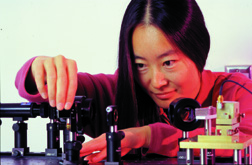Cornell biophysicist Michelle D. Wang receives $1 million Keck Distinguished Young Scholar award
By Roger Segelken

Michelle D. Wang, assistant professor of physics at Cornell University, has been named a Keck Distinguished Young Scholar. Her research into the molecular mechanisms of gene expression will be supported by up to $1 million in grants to the university over the next five years from the W.M. Keck Foundation.
A faculty member in the College of Arts and Sciences' Department of Physics since 1998, Wang studies so-called biological molecular motors, such as the RNA polymerase molecules that move along a DNA template during cell division to help transcribe genetic information from DNA into new RNA.
The Keck Foundation's scientific advisory committee "was very impressed with your demonstrated ability to carry forward groundbreaking basic medical research, the potential for this research to make a significant impact in the field of biomedicine and your capacity for future leadership," Robert A. Day, the foundation's chairman, said in announcing the award to Wang.
Wang is one of only five faculty scientists at institutions in the United States to receive Keck Distinguished Young Scholar awards in 2000, the second year of the new grant program. The program is designed to advance the early career development of the country's brightest young biomedical scientists. A total of 30 research universities, medical schools and independent research institutions were invited to nominate candidates to the foundation, which was founded in 1954 by the late W.M. Keck, founder of Superior Oil Co. The foundation's grant-making is focused primarily on pioneering efforts in higher education, medical research, science and engineering. At Cornell, the foundation is also the principal sponsor of the W.M. Keck Program in Nanobiotechnology.
Distinguished Young Scholar awards from the foundation are made to the institutions for use by the scholars, at their discretion, to support their research and are not intended to relieve the recipients of their teaching responsibilities. Wang will continue to teach physics at Cornell to undergraduates and graduate students, she says, noting that the Keck award "will allow me to explore innovative research directions."
Accepting the Keck award to the university, Cornell President Hunter Rawlings said: "The foundation's support of the nation's most promising young scientists is creating new and exciting opportunities, and I applaud your efforts to strengthen scientific education at Cornell and elsewhere."
Previous awards to Wang, who earned her Ph.D. in biophysics from University of Michigan in 1993, include a major fellowship from the Cancer Research Fund of the Damon Runyon-Walter Winchell Foundation, the Beckman Young Investigator Award and a Sloan Research Fellowship.
Media Contact
Get Cornell news delivered right to your inbox.
Subscribe